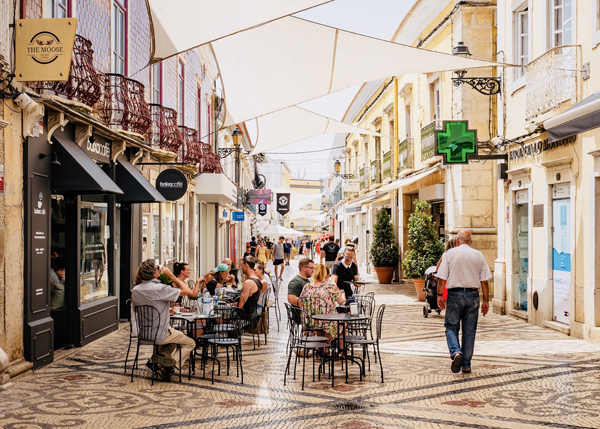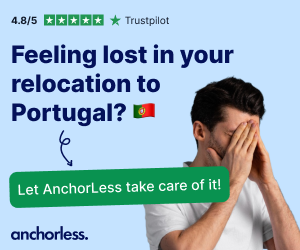Cost of Living in Faro
Summary: If you're moving to Faro, understanding the the cost of living in Faro helps you know what to expect when it comes to apartment or house hunting, grocery shopping, transportation, dining out, utilities and more.

| Category | Cost |
|---|---|
| Apartment Rental (1 bedroom in City Centre) | €600 - €800 per month |
| Apartment Rental (1 bedroom Outside of Centre) | €500 - €700 per month |
| Apartment Purchase (Price per Square Meter in City Centre) | €2,000 - €3,000 |
| Apartment Purchase (Price per Square Meter Outside of Centre) | €1,500 - €2,500 |
| Transportation (Monthly Pass) | €36 |
| Transportation (Taxi Start) | €3.50 |
| Transportation (Taxi 1km) | €0.90 |
| Groceries (Milk, 1 liter) | €0.60 |
| Groceries (Bread, 500g) | €1.10 |
| Groceries (Rice, 1kg) | €0.90 |
| Groceries (Eggs, 12) | €1.80 |
| Groceries (Chicken Breasts, 1kg) | €6.50 |
| Restaurants (Meal for 2 People, Mid-range Restaurant, Three-course) | €30 - €50 |
| Restaurants (Domestic Beer, 0.5 liter draught) | €2.00 |
| Restaurants (Cappuccino) | €1.50 |
| Utilities (Basic Electricity, Heating, Cooling, Water, Garbage for 85m2 Apartment) | €100 - €150 per month |
| Utilities (Internet) | €30 - €50 per month |
| Private School Tuition (Preschool) | €300 - €500 per month |
| Private School Tuition (Elementary School) | €400 - €600 per month |
| Private School Tuition (Middle School) | €500 - €700 per month |
| Private School Tuition (High School) | €600 - €800 per month |
Monthly Budget for Retirees in Faro
"The cost of living in Faro is considered to be relatively affordable compared to other European cities. Rent for a one-bedroom apartment in the city center is moderately priced, while outside the city center, it is even cheaper. The cost of utilities such as electricity, heating, cooling, water, and garbage is also quite reasonable. Groceries in Faro are also affordable, with local markets offering fresh produce at lower prices. Eating out at restaurants can vary, with inexpensive restaurants being quite affordable, while a three-course meal for two at a mid-range restaurant can be more expensive. Public transportation in Faro is also reasonably priced, with monthly passes available for regular commuters. Gasoline prices are on par with the rest of Europe. Healthcare in Faro is of good quality and is affordable, especially if you are covered by the Portuguese healthcare system. Private health insurance is also available at a higher cost. Overall, the cost of living in Faro is lower than in many other cities in Western Europe, making it an attractive place for expats and retirees," said one expat living in Faro.
Can I live in Faro on $1,500 a month?
"I've been living in Faro for a few years now and I can tell you that it's definitely possible to live comfortably on $1,500 a month, but it does require some careful budgeting and lifestyle adjustments. The cost of living in Faro is relatively low compared to other European cities, but it's still important to be mindful of your spending. For housing, I'd recommend looking at neighborhoods like Gambelas or Montenegro. They're a bit further from the city center, but the cost of rent is much more affordable. You can find a decent one-bedroom apartment for around $600-$700 a month. On the other hand, neighborhoods like Baixa or Vila Adentro are more expensive, with rents often exceeding $1,000 a month, so I'd avoid those if you're trying to stick to your budget.When it comes to utilities, expect to pay around $100-$150 a month for electricity, water, and gas. Internet and mobile phone services are relatively cheap, usually around $30-$40 a month. Groceries can be quite affordable if you shop at local markets and avoid imported goods. I usually spend around $200-$250 a month on groceries. Eating out can be affordable too, with a typical meal at a local restaurant costing around $10-$15.Public transportation is also quite cheap, with a monthly pass costing around $40. However, if you prefer to drive, keep in mind that petrol costs are quite high compared to the US.As for entertainment, there are plenty of free or low-cost activities to enjoy in Faro. The city has beautiful beaches, parks, and historical sites that you can visit for free. However, if you enjoy nightlife or high-end dining, you might have to limit these activities to stay within your budget.In terms of sacrifices, you might have to give up some of the luxuries you're used to. For example, you might have to opt for a smaller apartment or live a bit further from the city center. You might also have to cook at home more often instead of eating out, and limit your spending on entertainment. But overall, I've found that the cost of living in Faro is quite reasonable and it's definitely possible to live comfortably on $1,500 a month," commented an expat living in Faro.
Can I live in Faro on $3,500 a month?
"I've been living in Faro for a few years now and I can tell you that it's definitely possible to live comfortably on $3,000 a month, even if you're used to modern amenities. The cost of living here is quite reasonable compared to many other European cities. For instance, you can rent a decent one-bedroom apartment in the city center for around $700-$800 a month. If you're willing to live a bit further out, in neighborhoods like Gambelas or Montenegro, you can find even cheaper options. These areas are a bit quieter and more residential, but they're still close to all the amenities you'd need. On the other hand, neighborhoods like the downtown area or Praia de Faro tend to be more expensive, so you might want to avoid those if you're trying to stick to a budget. When it comes to utilities, you're looking at around $100-$150 a month, depending on the season. Groceries are also quite affordable, especially if you shop at local markets. I usually spend around $200-$300 a month on groceries. Eating out can be as cheap or as expensive as you want it to be. There are plenty of affordable local restaurants where you can get a meal for under $10. But if you prefer dining at more upscale places, you'll obviously have to budget more for that. Transportation costs are also quite low. A monthly pass for public transportation costs around $40. If you prefer to drive, gasoline costs are a bit higher than in the U.S., but still manageable. The biggest sacrifice you might have to make is probably related to entertainment and leisure activities. While there are plenty of free or low-cost things to do in Faro, if you're used to regularly attending high-end events or activities, you might have to cut back on those. But overall, I've found that the quality of life here is excellent, and there's no shortage of things to do and see. So, in my experience, living in Faro on $3,000 a month is not only doable, but you can live quite comfortably. Of course, everyone's lifestyle and spending habits are different, so you'll have to take that into account. But if you're willing to live a bit more modestly, you can definitely make it work," said one expat living in Faro.
Can I live in Faro on $5,000 a month?
"I've been living in Faro for a few years now and I can tell you that living on $5,000 a month is not only possible, but you can live quite comfortably. The cost of living here is significantly lower than in many other European cities. For instance, you can rent a nice one-bedroom apartment in the city center for around $800-$900 a month. If you prefer to live in a more upscale neighborhood like Quinta do Lago or Vale do Lobo, you might have to pay a bit more, maybe around $1,500 a month. But these areas are more expensive because they're close to the beach and have a lot of luxury villines. On the other hand, if you're looking for more affordable neighborhoods, I'd recommend areas like Montenegro or Gambelas. They're still close to the city center but the rent is much cheaper, around $600-$700 a month for a one-bedroom apartment. When it comes to utilities, you're looking at around $100-$150 a month, depending on the season. Groceries are also quite affordable. I spend around $300 a month on groceries and I eat a lot of fresh fruits, vegetables, and fish. Eating out is also not expensive. You can have a nice meal in a restaurant for around $15-$20. Transportation is also not a big expense. The public transportation system is quite good and a monthly pass costs around $40. If you prefer to drive, gasoline costs around $1.60 per liter. Healthcare is also affordable. The public healthcare system is good and if you prefer private healthcare, an insurance policy costs around $50-$100 a month. So, as you can see, living on $5,000 a month in Faro is quite doable. You won't have to make any major sacrifices. You can live in a nice neighborhood, eat well, and enjoy all the modern amenities you're used to," commented an expat living in Faro.
About the Author
 Betsy Burlingame is the Founder and President of Expat Exchange and is one of the Founders of Digital Nomad Exchange. She launched Expat Exchange in 1997 as her Master's thesis project at NYU. Prior to Expat Exchange, Betsy worked at AT&T in International
and Mass Market Marketing. She graduated from Ohio Wesleyan University
with a BA in International Business and German.
Betsy Burlingame is the Founder and President of Expat Exchange and is one of the Founders of Digital Nomad Exchange. She launched Expat Exchange in 1997 as her Master's thesis project at NYU. Prior to Expat Exchange, Betsy worked at AT&T in International
and Mass Market Marketing. She graduated from Ohio Wesleyan University
with a BA in International Business and German.
Some of Betsy's articles include 12 Best Places to Live in Portugal, 7 Best Places to Live in Panama and 12 Things to Know Before Moving to the Dominican Republic. Betsy loves to travel and spend time with her family. Connect with Betsy on LinkedIn.
Additional Information:
- 7 Tips for Living in Faro
- Pros & Cons of Living in Faro
- Tips for Expats Driving in Faro
- Health Care in Faro
- The Essential Guide to Faro
- Cost of Living in Faro
- Healthcare & Health Insurance in Portugal
- Best Places to Live in Portugal
- Real Estate in Portugal
- Mental Health Care in Portugal
- Pros and Cons of Living in Portugal 2025
- 2025 Guide to Moving to Portugal
- More Advice about Retiring in Portugal




